☆ PuniPuni Youtube ☆
Japanese Grammar – Verbs: Plain form to Masu form – Review Notes
As we learned in our last Japanese grammar lesson, there are 3 types of Japanese verbs.
In today’s grammar lesson, we learned how to change verbs in each of the 3 verb classes from Plain form to ます-form (masu form)
In these video review notes we will go over today’s Japanese grammar in greater detail and see a list of verbs!
………………………………………………………………………………..
Today’s Grammar Lesson:
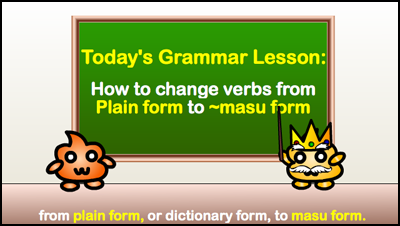
★ Today we will learn how to change verbs from plain form to ます-form (masu form)
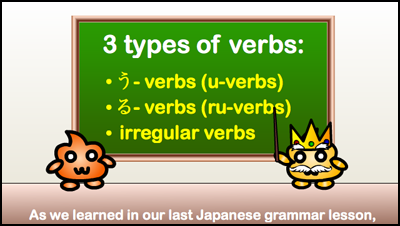
★ We learned last time that there are 3 classes of Japanese verbs:
★ う-verbs (u-verbs)
★ る-verbs (ru-verbs)
★ irregular verbs
………………………………………………………………………………..
Changing う-verbs (u-verbs) to ます- form
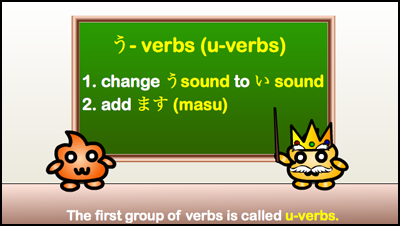
★ The first type of Japanese verbs is called う-verbs (u-verbs).
★ To change an う-verb (u-verb) from Plain form to ます- form (masu form):
★ change the final う sound (‘u’ sound) to an い sound (‘i’ sound)
★ add ます (masu) to the end
………………………………………………………………………………..
Note:
★ In the case of a verb that ends in つ (tsu) or す (su), you have to be a little careful.
★ verbs ending in つ (tsu) change to ち (chi). For example, 待つ(まつ – matsu) changes to待ちます(まちます – machimasu).
★ verbs ending in す (su) change to し (shi). For example, 話す(はなす – hanasu) changes to話します(はなします – hanashimasu).
………………………………………………………………………………..
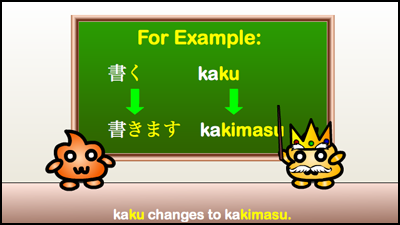
★ 書く(かく – kaku) is the plain form of the verb meaning “to write”
★ 書く(かく – kaku) changes to 書きます(かきます – kakimasu)
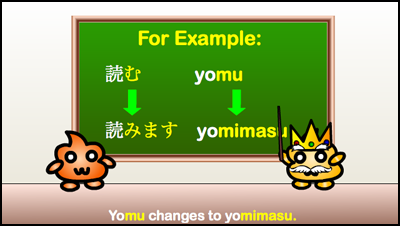
★ 読む(よむ – yomu) is the plain form of the verb meaning “to read”
★ 読む(よむ – yomu) changes to 読みます(よみます – yomimasu)
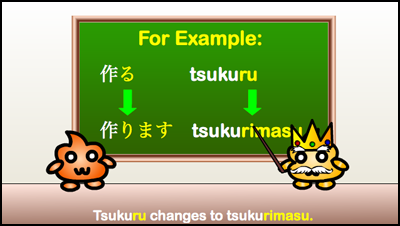
★ 作る(つくる – tsukuru) is the plain form of the verb meaning “to make”
★ 作る(つくる – tsukuru) changes to 作ります(つくります – tsukurimasu)
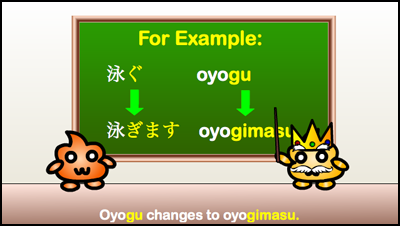
★ 泳ぐ(およぐ – oyogu) is the plain form of the verb meaning “to swim”
★ 泳ぐ(およぐ – oyogu) changes to 泳ぎます(およぎます – oyogimasu)
………………………………………………………………………………..
Changing る-verbs (ru-verbs) to ます- form
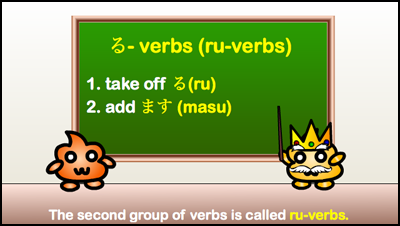
★ The second type of Japanese verbs is called る-verbs (ru-verbs).
★ To change a る-verb (ru-verb) from plain form to ます-form:
★ Take off る (ru)
★ Add ます (masu)
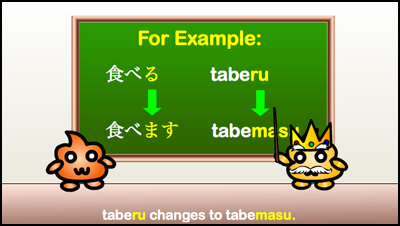
★ 食べる(たべる – taberu) is the plain form of the verb meaning “to eat”
★ 食べる(たべる – taberu) changes to 食べます(たべます – tabemasu)
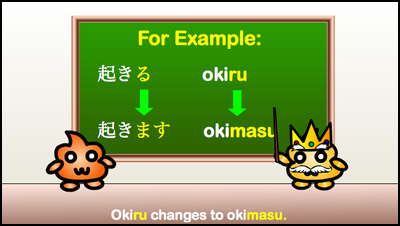
★ 起きる(おきる – okiru) is the plain form of the verb meaning “to get up”
★ 起きる(おきる – okiru) changes to 起きます(おきます – okimasu)
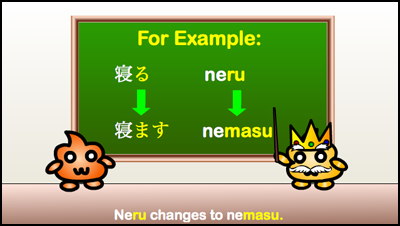
★ 寝る(ねる – neru) is the plain form of the verb meaning “to go to sleep”
★ 寝る(ねる – neru) changes to 寝ます(ねます – nemasu)
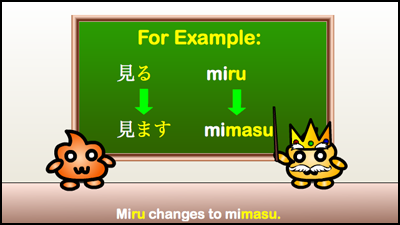
★ 見る(みる – miru) is the plain form of the verb meaning “to see” or “to watch”
★ 見る(みる – miru) changes to 見ます(みます – mimasu)
………………………………………………………………………………..
Changing Irregular Verbs to ます- form
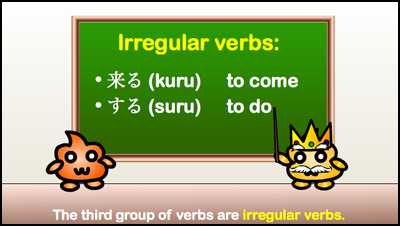
★ There are only 2 irregular verbs in Japanese:
★ 来る(くる – kuru) which means ‘to come’
★ する (suru) which means ‘to do’
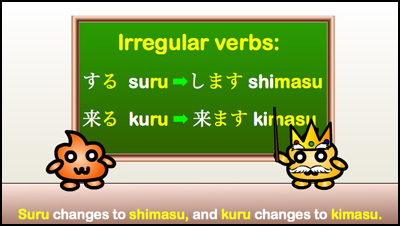
★ 来る (くる – kuru) changes to 来ます(きます – kimasu)
★ する (suru) changes to します (shimasu)
………………………………………………………………………………..
List of Japanese Verbs in Masu Form:
………………………………………………………………………………..
List of some common う-verbs in ます- form:
洗います あらいます araimasu to wash
歩きます あるきます arukimasu to walk
遊びます あそびます asobimasu to play
会います あいます aimasu to meet
黙ります だまります damarimasu to be silent
騙します だまします damashimasu to trick
選びます えらびます erabimasu to choose / pick
太ります ふとります futorimasu to gain weight
頑張ります がんばります ganbarimasu to do one’s best
入ります はいります hairimasu to enter
話します はなします hanashimasu to speak / talk
払います はらいます haraimasu to pay
光ります ひかります hikarimasu to shine
行きます いきます ikimasu to go
買います かいます kaimasu to buy
勝ちます かちます kachimasu to win
聞きます ききます kikimasu to listen
守ります まもります mamorimasu to protect
待ちます まちます machimasu to wait
持ちます もちます mochimasu to hold / have
泣きます なきます nakimasu to cry
怒ります おこります okorimasu to get angry
思います おもいます omoimasu to think / believe
終わります おわります owarimasu to end
泳ぎます およぎます oyogimasu to swim
知ります しります shirimasu to know
立ちます たちます tachimasu to stand
使います つかいます tsukaimasu to use
動きます うごきます ugokimasu to move
歌います うたいます utaimasu to sing
……………………………………………………………………………….
List of some common る-verbs in ます- form:
開けます あけます akemasu to open
褒めます ほめます homemasu to praise
惚れます ほれます horemasu to fall in love
生きます いきます ikimasu to live
入れます いれます iremasu to put in
考えます かんがえます kangaemasu to think
借ります かります karimasu to borrow
片付けます かたづけます katazukemasu to tidy up
数えます かぞえます kazoemasu to count
消えます きえます kiemasu to disappear
聞こえます きこえます kikoemasu to hear
答えます こたえます kotaemasu to answer
負けます まけます makemasu to lose
見ます みます mimasu to see / look
見せます みせます misemasu to show
覚えます おぼえます oboemasu to remember
落ちます おちます ochimasu to fall
教えます おしえます oshiemasu to teach
捨てます すてます sutemasu to throw away
助けます たすけます tasukemasu to help / save
足ります たります tarimasu to be enough
疲れます つかれます tsukaremasu to get tired
忘れます わすれます wasuremasu to forget
辞めます やめます yamemasu to quit
……………………………………………………………………………….
Want to learn over 600 Japanese verbs and have a quick and easy reference to all of their conjugations?? We recommend the Complete Japanese Verb Guide from Tuttle! ⬇
In addition to being a quick but thorough reference to over 600 verbs and their conjugations, it also includes hundreds of useful example sentences! Get it now!
……………………………………………………………………………….
Next Grammar Lesson:
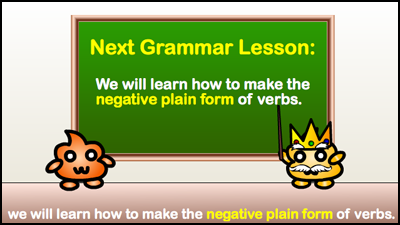
★ Next time we will learn how to make the negative plain form of verbs!
……………………………………………………………………………….
Do you want a Japanese tutor?
Take Japanese Skype Lessons with Professional Japanese Teachers on kakehashijapan.com!
………………………………………………………………………………..
………………………………………………………………………………..











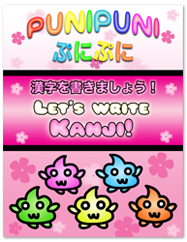


3 comments
To change it to a negative form we just add ません right?
Comment by Noor on 12/21/2013 at 7:22 amYes, to change to the negative polite form, change ます to ません. (◕ω◕)☆ http://www.punipunijapan.com/grammar-lesson-8-masu-verbs/
Comment by PuniPuni on 12/22/2013 at 9:37 pmI am learning Japanese on my own for a month. Your website is so very helpful! I don’t know what I would do without you. Please, never stop! Thanks <3 Merci 😀 (je suis française/フランス人です)
Comment by 歌 on 04/05/2014 at 4:52 pm